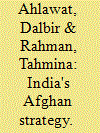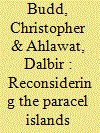|
|
|
Sort Order |
|
|
|
Items / Page
|
|
|
|
|
|
|
| Srl | Item |
| 1 |
ID:
140385


|
|
|
|
|
| Summary/Abstract |
India and Australia held a set of largely divergent strategic perspectives during the Cold War period, which prevented any significant strategic relationship from developing at that time. Since the end of the Cold War, however, strategic relations between the two countries, although still volatile, have steadily improved. This article argues that as the Indo-Pacific region is increasingly seen as an arena of strategic importance in both New Delhi and Canberra, there is increased scope for a further convergence of Indo-Australian strategic relations based on a series of shared core security concerns. However, in the context of a rising China and re-assertive US in the region, there is a danger that bilateral relations between each of the two countries and the US may serve to prevent a strengthening of independent Indo-Australian relations. First, the post-World War II security policies of both India and Australia are outlined, as are the places occupied by each country in the strategic perspectives of the other. Then, the post-Cold War convergence of security perspectives of both nations is examined in the context of the emerging importance of the Indo-Pacific region in terms of both non-state security challenges and traditional balance-of-power concerns. Finally, the pressures exacted on potential Indo-Australian strategic relations by a rising China and re-assertive US are considered. It is argued that although convergence has begun, India and Australia still have a long way to go before they can initiate a robust and independent bilateral security partnership.
|
|
|
|
|
|
|
|
|
|
|
|
|
|
|
|
| 2 |
ID:
134111


|
|
|
|
|
| Publication |
2014.
|
| Summary/Abstract |
With the deadline for the US withdrawal from Afghanistan getting closer, regional and extra-regional states have indicated pivoting their Afghan strategy. India, being an emerging power, holds much potential to contribute to the stabilisation and reconstruction of war-torn Afghanistan by developing strategic partnership with other stakeholders. For this, India's status in the regional and international system, its economic and military might and its strategy to reach beyond its traditional zone of influence warrant a systemic analysis of its Afghan strategy. The article traces the antecedents of India's current strategic and foreign policy in classical Indian strategic text Arthashstra and analyses India's present level of involvement in Afghanistan in the light of that discussion. An attempt is made in this paper to show how India's Afghan strategy is informed and influenced by its perception of allies, enemies and indifferent big powers. The paper also suggests some policy changes by critically assessing the broader context in which India operates today.
|
|
|
|
|
|
|
|
|
|
|
|
|
|
|
|
| 3 |
ID:
141909


|
|
|
|
|
| Summary/Abstract |
The Paracel Islands dispute has recently resurfaced as a source of conflict between Vietnam and China, who both claim sovereignty over the islands from ‘time immemorial’. This article re-examines their respective claims from an international law perspective. It also focuses on delineating the respective claims with emphasis on sovereignty, territory and self-determination. Based on available sources, this article suggests that Vietnam appears to have a more credible sovereignty claim over the Paracel Islands vis-à-vis China. Having thus assumed Vietnamese sovereignty, this article then sets out to explore the maritime zones that Vietnam would be entitled to under the United Nations Convention on the Law of the Sea.
|
|
|
|
|
|
|
|
|
|
|
|
|
|
|
|
|
|
|
|
|